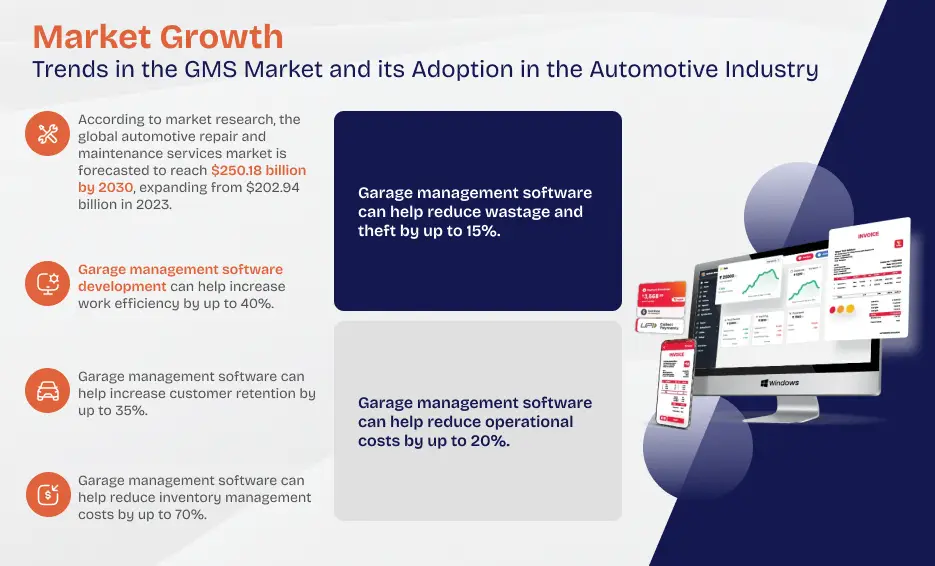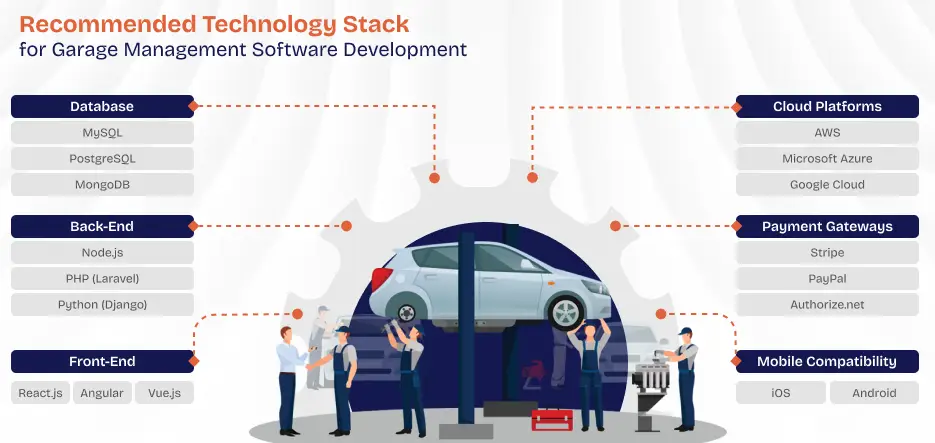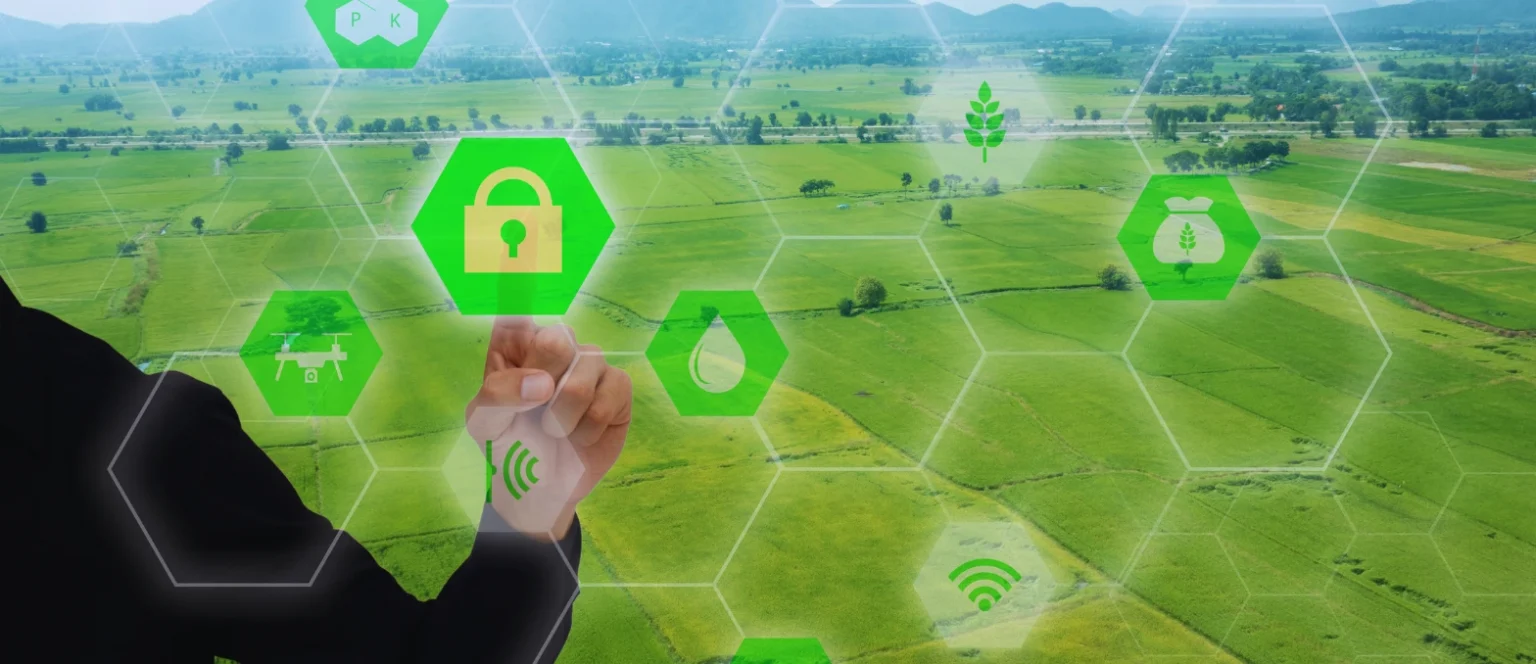Table of Contents
Garage Management Software is an integrated, web-based platform. It simplifies the operations of automotive repair shops and garages. Ensuring main operative tasks like appointment scheduling, customer management, invoicing, tracking of vehicle history, and management of inventory. Merging all these in auto workshop management software development increases the speed and efficiency of operations and decreases administrative work while enhancing the customer experience.
This can be attributed not only to the advancement of the technical field in terms of diagnostic devices and software but also to the complexity of modern vehicles. Modern vehicle owners demand greater efficiency and speed in repairs, making investment in suitable garage management software critical for repair shops to remain competitive and sustain a business at, or even above, its previous pace.
Market Growth: Trends in the GMS Market and its Adoption in the Automotive Industry

- According to market research, the global automotive repair and maintenance services market is forecasted to reach $250.18 billion by 2030, expanding from $202.94 billion in 2023.
- Garage management software development can help increase work efficiency by up to 40%.
- Garage management software can help increase customer retention by up to 35%.
- Garage management software can help reduce inventory management costs by up to 70%.
- Garage management software can help reduce wastage and theft by up to 15%.
- Garage management software can help reduce operational costs by up to 20%.
How Does Garage Management Software Work?
It automates and digitizes the most important processes within a garage, from managing and updating service appointments to tracking information about clients and inventory management. Every time a customer requests a service, the software generates a job order and assigns a specific technician while tracking every step of the repair process. This minimizes human error, makes services quicker, and ensures that all operations are running accordingly. Vehicle repair management software also provides real-time updates for running repairs, parts available, and assignments of a technician.
Must-Have Key Modules in Your Garage Management Software Development
These key modules are critical to ensuring efficient, smooth, and profitable garage operations. By implementing these features, garage management software development can provide better customer experiences, optimize resource allocation, and streamline administrative tasks.
Customer Management Module
This module centralizes customer data, including vehicle information, contact details, and service history. By storing such information, it enables garages to deliver personalized services, target specific customer needs with marketing campaigns, and boost customer retention. Customer management systems also ensure that all relevant data is accessible, facilitating quick service updates or follow-ups.
Easy Appointment Scheduling
This module allows customers to book appointments online or over the phone. It automatically synchronizes with the garage’s schedule, ensuring that technicians and resources are appropriately allocated without causing overlaps or double bookings. With seamless scheduling, garages can offer flexibility to customers while optimizing time management and improving workflow efficiency.
Importance of Job Order Management
The job order management module organizes the entire service process, from order creation to task assignment and job completion. This vehicle management system ensures transparency and accountability, as technicians and managers can track the status of each repair in real-time, ensuring that all tasks are completed on schedule and minimizing any potential delays.
Vehicle History Tracking
This module keeps a comprehensive record of a vehicle’s service and repair history, allowing technicians to access past data quickly. With insights into previous repairs, diagnostics, and services, technicians can make more informed recommendations and improve the speed and accuracy of future diagnostics and repairs. This helps build long-term trust and ensures consistent maintenance.
Inventory Management System
Efficiently manages the real-time stock of parts and supplies. The Inventory Management System sends alerts when inventory levels are low, preventing out-of-stock situations and potential delays in servicing vehicles. In addition, many advanced garage management software development platforms integrate directly with suppliers, automating the reordering process and ensuring smooth garage operations.
Simplified Invoicing & Billing
Automates the billing process by generating accurate invoices based on completed job orders, including parts, labor, and taxes. This module also integrates with payment gateways, streamlining the transaction process and offering multiple payment options. Simplified invoicing ensures transparency for customers and helps maintain financial organization.
Quick Employee Management
Tracks employee schedules, tasks, work hours, and overall performance. This module assists with payroll management and productivity tracking, ensuring that technicians are assigned tasks based on their skills and availability. It also provides insight into technician efficiency, helping managers optimize labor resources.
Purchase Order Management
It manages buying parts and materials by automating the procurement cycle wholly. This module tracks and monitors the status of a purchase order, manages supplier relationships, and ensures timely delivery of materials needed for successful repairs. Good purchase order management guards against delays caused by supply chain breakdowns.
Service Reminders
Service reminder is automatically sent for routine maintenance tasks, like oil change, tire rotation, or inspection due. This module, in turn, increases repeat business and keeps the vehicles in an optimal condition by keeping the customers aware of when various services are due.
Streamlining Warranty & Service Contracts
Monitor warranty on parts and service to ensure that repairs take place before the warranty period is over. Extended service contracts can be tracked too, reducing potential misunderstandings of coverage and sending reminders to customers as those contracts near their renewal date.
Multiple Payment Processing
It integrates with good, trustworthy payment gateways, such as Stripe, PayPal, and Authorize.net, which ensure safe payment processing. This module in garage management software development provides various payment options, which ensure safe transactions, are processed instantly, and give customers a smooth experience regarding the payments they have made.
Price Estimation and Quoting
This module generates accurate repair cost estimates by considering parts, labor, and any additional services required. Clear, itemized quotations ensure transparency, building customer trust and avoiding misunderstandings over service cost.
Technician Management for Garage
Allocates tasks to technicians based on their availability and skill set. It also tracks each technician’s performance and job completion times. This module in workshop management software ensures the optimal use of resources and helps maintain accountability across the team.
Easy Parts & Spare Management
Monitors the inventory of parts and spares, ensuring that garages have the necessary components in stock for repairs. It integrates with suppliers to facilitate fast reordering of parts when stocks are low, preventing delays in service.
Streamlined Fleet Management
For garages handling corporate or commercial fleet clients, this module tracks the maintenance schedules of multiple vehicles, ensuring minimal downtime and optimizing fleet performance. The garage management system helps manage bulk repair orders and ensures that all vehicles receive timely service.
Simplified Service Checklists
Provides technicians with standardized checklists for various repair and maintenance tasks. This ensures consistent service quality and helps reduce errors by guiding technicians through the required steps for each job.
Streamlined Reporting & Analytics
Generates comprehensive reports on various aspects of garage operations, such as revenue, sales performance, technician productivity, and customer satisfaction. Analytics tools provide insights that help business owners make informed decisions and improve overall operations.
Mobile Application Compatibility
Garage management app development enables garage managers and technicians to access the garage management software on the go, providing real-time updates on job orders, schedules, and inventory. The mobile application improves operational flexibility, allowing managers to monitor operations even when they are not on-site.
Customer Feedback and Review Management
Collects and manages customer feedback post-service, enabling garages to improve their services continuously. This module also helps manage online reviews and respond to customer feedback, improving customer satisfaction and loyalty.
Vendor Management System
Keeps track of vendor relationships, purchase orders, and deliveries. By efficiently managing suppliers, auto repair management software can ensure a steady supply of parts and maintain smooth operations, reducing the risk of supply chain disruptions.
Book 30 Minutes Free Consultations with A3Logics Experts to Start Your Software Journey Today!
Blockchain Development Services EDI Solutions Custom Software Development
Artificial Intelligence Development
Advanced Features for Enhanced Garage Management Software
AI-Powered Predictive Maintenance
Artificial Intelligence is revolutionizing vehicle maintenance development services by predicting when specific parts or systems are likely to fail based on historical data and the performance of similar vehicles. This feature uses machine learning models to analyze patterns in vehicle performance and repair data, allowing garages to schedule maintenance before a failure occurs. Predictive maintenance not only reduces unexpected breakdowns but also extends vehicle life by ensuring timely repairs. For garages, this proactive service improves customer satisfaction and generates additional revenue from preventative services.
IoT Integration for Vehicle Diagnostics
The Internet of Things (IoT) enables vehicles to be equipped with sensors that monitor real-time diagnostics, such as engine performance, fluid levels, and tire pressure. This data is transmitted to the garage through cloud-based systems, allowing technicians to diagnose issues remotely before the vehicle arrives at the garage. IoT integration significantly reduces troubleshooting time, helping garages to better prepare for upcoming repairs and order the necessary parts in advance. It also improves customer service, as vehicles spend less time in the shop.
Smart Quotation Systems for Price management
Automated quotation systems leverage vehicle diagnostics data and pre-set labor and parts costs to generate accurate service quotes instantly. By analyzing the diagnostics from a vehicle, these systems calculate the necessary repairs and provide a detailed estimate for the customer. This not only reduces the manual effort involved in preparing quotations but also ensures transparency. Customers appreciate the clarity, and garages can trust that the pricing is consistent and based on data, reducing pricing disputes.
Advanced Data Analytics and Business Intelligence (BI) Tools
Business Intelligence (BI) tools offer advanced data analytics capabilities that allow garage owners to make data-driven decisions. These tools analyze customer behavior, vehicle repair trends, technician productivity, and financial metrics, providing insights that can optimize operations. For example, garages can track which services are most profitable, monitor customer retention rates, and identify opportunities for cost savings. Additionally, BI tools can offer predictive insights, helping garages to plan for future demand based on historical data and market trends.
Self-Service Portals for Customers
A self-service portal allows customers to manage their interactions with the garage conveniently. Through the portal, customers can schedule appointments, track the status of their repairs, review their vehicle’s service history, and even make payments. This feature improves customer satisfaction by providing transparency and 24/7 access to their account information. For garages, self-service portals reduce administrative workload by automating appointment scheduling and customer inquiries.
Telematics Integration for Tracking
Telematics involves the integration of GPS and onboard diagnostics to monitor vehicle performance and location in real time. This feature is particularly valuable for garages that service fleets, as it enables real-time tracking of multiple vehicles. Fleet managers can optimize repair schedules by identifying which vehicles need maintenance based on their performance data, leading to fewer breakdowns and less downtime. Telematics also helps garages to provide more efficient and personalized services by tailoring repairs to the specific needs of each vehicle in the fleet.
Robust CRM with Automated Marketing
A robust Customer Relationship Management (CRM) system integrated with automated marketing tools enables garages to maintain and strengthen their customer relationships. CRM systems store customer data, including service history and preferences, allowing garages to offer personalized marketing campaigns. Automated marketing features, such as email reminders for upcoming maintenance or promotional offers, help garages stay engaged with their customers. This proactive engagement increases customer loyalty and drives repeat business.
Voice-Assisted Interface
Voice-assisted technology allows garage staff to interact with the garage management software using voice commands. This integration with popular voice assistants like Amazon Alexa and Google Assistant enhances efficiency, especially in busy workshop environments where hands-free operation is critical. Technicians can retrieve job orders, check inventory levels, or update task statuses without needing to stop and input data manually, speeding up workflow and reducing the chances of errors.
Mobile Mechanics Dispatching
This feature supports garages that offer mobile repair services, allowing them to dispatch technicians to customer locations. The auto repair management system uses GPS tracking to assign jobs to the nearest available technician, optimizing response times and ensuring efficient service delivery. Mobile mechanics dispatching enhances customer convenience and provides a new revenue stream for garages that can service customers at home or on the road.
Integration with Payment and Financing Platforms
By integrating with popular payment gateways like Stripe, PayPal, or Authorize.net, garages can offer secure and flexible payment options to their customers. Additionally, integration with financing platforms enables customers to opt for payment plans, making expensive repairs more affordable. These integrations help to streamline the payment process, reduce the time spent on invoicing, and improve the overall customer experience by providing multiple payment and financing options.
Benefits of Implementing Garage Management Software
Operational Efficiency
By automating daily tasks, garage management software reduces human errors, speeds up service, and ensures optimal resource use, leading to increased productivity.
Enhanced Customer Experience
Features like self-service booking, service reminders, and real-time repair status updates improve the overall customer experience.
Data-Driven Insights
GMS provides insightful data on technician performance, parts usage, customer preferences, and revenue, allowing for data-driven decision-making.
Cost Savings
Efficient job tracking, inventory management, and reduced administrative tasks translate into long-term cost savings for garages.
Key Considerations Before Garage Management Software Development
Customization vs. Off-the-Shelf Solutions
Custom garage management solutions can be tailored to the specific needs of a business, while off-the-shelf solutions offer quicker deployment at a lower cost.
Scalable Solutions
The software should be capable of scaling with the business, supporting additional users, services, or locations as needed.
Integration with Existing Systems
Ensure that the GMS software integrates smoothly with other systems like accounting software, CRM, or ERP to avoid data silos.
Compliance and Data Security
The system should adhere to data privacy laws and ensure that customer data is stored and handled securely.
Cost Breakdown for Garage Management Software Development
| Feature | Cost Estimate |
|---|---|
| Basic Features | $20,000 – $50,000 |
| Advanced Features | $50,000 – $100,000 |
| Cloud Hosting | Varies (e.g., AWS, Google Cloud) |
| Post-Development Maintenance | $5,000 – $10,000 annually |
| Licensing Fees | Varies based on services |
Step-by-Step Development Process for GMS
1. Requirement Gathering
This phase involves understanding the specific needs of the garage. Stakeholders like owners, managers, and technicians share insights into daily operations, highlighting essential features such as appointment scheduling, inventory management, and customer management. Detailed interviews and workflow analysis help shape the initial GMS software requirements. Scalability and future needs, like potential fleet management, are also considered.
2. Planning and Design
In this stage, the design team creates wireframes and prototypes to provide a visual representation of how the software will function. A well-thought-out user experience (UX) ensures the garage management software will be intuitive for users. The development team also plans out the architecture and selects the technology stack for front-end and back-end development, ensuring the system will be scalable and secure. Planning also involves creating a timeline for auto repair management software development and resource allocation to keep the project on track.
3. Development
This is where the coding begins. Front-end development focuses on creating an interactive and user-friendly interface using frameworks like React.js or Angular. The back-end development involves building the server-side functionalities that handle job order management, customer data, and real-time inventory updates. Database development manages data storage, using solutions like MySQL or MongoDB. Integration of payment gateways and service reminders ensures a seamless and functional user experience.
4. Testing
During this phase, various forms of testing are conducted to ensure everything works as expected. Unit testing checks individual components, while integration testing ensures different software modules work together. Usability testing ensures the system is user-friendly for garage employees, and performance testing checks if the system can handle peak loads. Bugs or issues found during testing are fixed before deployment.
5. Deployment
The GMS software is now deployed to the garage. Depending on the garage’s needs, this may involve a cloud-based solution like AWS or an on-premise deployment. During deployment, the development team provides initial support to ensure smooth operation and resolve any issues that arise. Employees are trained on how to use the system to ensure it is fully functional from day one.
6. Ongoing Support
Post-deployment, ongoing maintenance is critical to ensure the software remains up to date and runs smoothly. Regular updates, bug fixes, and performance enhancements are part of the maintenance package. As technology evolves, new features such as AI-powered predictive maintenance or IoT vehicle diagnostics can be integrated to keep the system competitive.
Recommended Technology Stack for Garage Management Software Development

| Technology Layer | Options |
|---|---|
| Front-End | React.js, Angular, Vue.js |
| Back-End | Node.js, PHP (Laravel), Python (Django) |
| Database | MySQL, PostgreSQL, MongoDB |
| Cloud Platforms | AWS, Microsoft Azure, Google Cloud |
| Payment Gateways | Stripe, PayPal, Authorize.net |
| Mobile Compatibility | iOS and Android |
How A3Logics Can Assist in Garage Management Software Development
A3Logics offers comprehensive support in Garage Management Software development tailored to the specific needs of your business. With a team of experienced developers, the company ensures that the software is scalable, secure, and user-friendly, providing advanced features like AI-powered predictive maintenance, real-time analytics, and seamless integration with third-party platforms. Whether you need customized modules for inventory management, technician scheduling, or payment processing, A3Logics is a leading custom software development company that offers solutions that improve both operational efficiency and customer satisfaction. Additionally, our continuous support and regular updates guarantee that your software evolves alongside your business, ensuring long-term success.
Conclusion
A garage management software investment is critical for automobile businesses interested in streamlining their service delivery, cutting costs, and engaging their customers in great experiences. The right GMS solution would help repair shops automate processes, bring customers closer to their destinations on better service and gain valuable insights through data analytics, making the product unbeatable in today’s competitive landscape.






